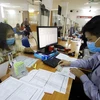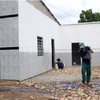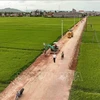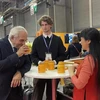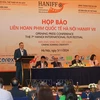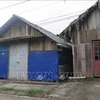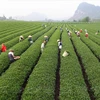Vietnam imports over 85 percent of its medicinal ingredients and herbs to produce medicines; despite the country being home to various kinds of medicinal plants, reports Drug Administration of Vietnam.
" Vietnam currently has 3,800 medicinal plants that can produce medicines, with the World Health Organisation confirming that the country is home to 200 precious medicinal herbs," said Health Deputy Minister Cao Minh Quang.
The country annually produces some 3,000-5,000 tonnes of medicinal materials.
However, Quang said, the exploitation, production and trade of the medicinal materials had yet to take advantage of domestic resources.
According to health ministry statistics, there are over 300 units producing medicines from domestic materials, but only 10 of them meet the WHO's Good Manufacturing
Practices – part of a system covering the manufacture and testing of active pharmaceutical ingredients, diagnostics, pharmaceutical products and medical devices.
He added over-exploitation had caused the loss of some domestic materials that had been unique to Vietnam .
For example, the vang dang plant (coscinium fenestratum) was widely found in central Binh Phuoc province's Phuoc Long district a few years ago but now could hardly be seen after being over harvested.
Medicinal herbs in Vietnam were mainly grown, processed and traded by private businesses, making it difficult to meet standards, Quang said.
The administration also warned about quality of the medicinal materials when most of the materials were illegally imported.
Domestic pharmaceutical producers wanted to reduce production costs by purchasing domestic medicinal materials but faced insufficient supply, said Nguyen Tien Hung, general director of Medical Products Import Export Joint Stocks Company.
He said it was necessary to offer incentives for growing, processing and using medical herbs. Relevant authorities needed to improve their management of medicinal plant growing and trading./.
" Vietnam currently has 3,800 medicinal plants that can produce medicines, with the World Health Organisation confirming that the country is home to 200 precious medicinal herbs," said Health Deputy Minister Cao Minh Quang.
The country annually produces some 3,000-5,000 tonnes of medicinal materials.
However, Quang said, the exploitation, production and trade of the medicinal materials had yet to take advantage of domestic resources.
According to health ministry statistics, there are over 300 units producing medicines from domestic materials, but only 10 of them meet the WHO's Good Manufacturing
Practices – part of a system covering the manufacture and testing of active pharmaceutical ingredients, diagnostics, pharmaceutical products and medical devices.
He added over-exploitation had caused the loss of some domestic materials that had been unique to Vietnam .
For example, the vang dang plant (coscinium fenestratum) was widely found in central Binh Phuoc province's Phuoc Long district a few years ago but now could hardly be seen after being over harvested.
Medicinal herbs in Vietnam were mainly grown, processed and traded by private businesses, making it difficult to meet standards, Quang said.
The administration also warned about quality of the medicinal materials when most of the materials were illegally imported.
Domestic pharmaceutical producers wanted to reduce production costs by purchasing domestic medicinal materials but faced insufficient supply, said Nguyen Tien Hung, general director of Medical Products Import Export Joint Stocks Company.
He said it was necessary to offer incentives for growing, processing and using medical herbs. Relevant authorities needed to improve their management of medicinal plant growing and trading./.


